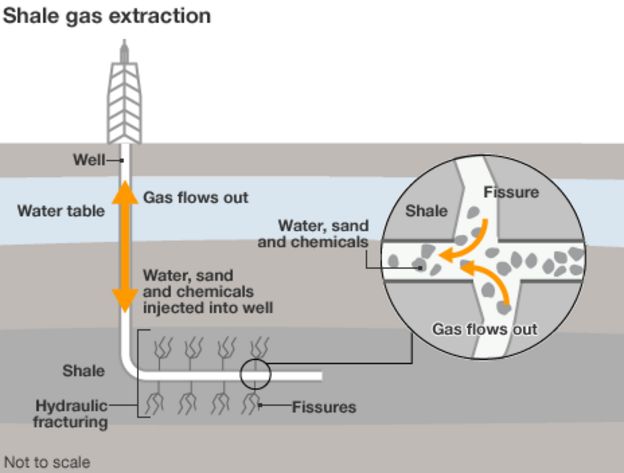 Drilling companies suggest trillions
of cubic feet of shale gas may be recoverable from underneath parts of
the UK through a process known as "fracking".
Drilling companies suggest trillions
of cubic feet of shale gas may be recoverable from underneath parts of
the UK through a process known as "fracking". Energy firm Cuadrilla has begun fracking in the UK for the first time since the process was halted in 2011 over earth tremor fears. But how does fracking work and why is it controversial?
What is fracking?
Fracking is the process of drilling down into the earth before a high-pressure water mixture is directed at the rock to release the gas inside.Water, sand and chemicals are injected into the rock at high pressure which allows the gas to flow out to the head of the well.
The process can be carried out vertically or, more commonly, by drilling horizontally to the rock layer, which can create new pathways to release gas or used to extend existing channels.
The term fracking refers to how the rock is fractured apart by the high-pressure mixture.
Is fracking taking place in the UK?
Drilling for shale gas is still at an exploratory phase.However, reserves of shale gas have been identified across large swathes of the UK, particularly in northern England.
 More than 100 licences have been awarded by the government, allowing firms to pursue a range of oil and gas exploration activities in certain areas.
More than 100 licences have been awarded by the government, allowing firms to pursue a range of oil and gas exploration activities in certain areas. Before companies can begin fracking they must also receive planning permission from the relevant local council.
Cuadrilla faced legal challenges before it could begin drilling at its Preston New Road site at Little Plumpton in Lancashire.
Applications have also been submitted in Yorkshire, Nottinghamshire and for a second site in Lancashire.
Other firms looking to start fracking include Third Energy, IGas, Aurora Energy Resources and Ineos.
However, Cuadrilla is the only company to receive final consent from the government to begin fracking.
Governments in Scotland, Wales and Northern Ireland have all said they will oppose fracking until further research is completed into its environmental impact.
Has test drilling been completed?
In 2011, Cuadrilla suspended test fracking operations near Blackpool after earthquakes of 1.5 and 2.2 magnitude hit the area.A subsequent study found it was "highly probable" that shale gas test drilling triggered the tremors.
A government-appointed panel said there could be more tremors as a result of fracking, but they will be too small to do structural damage above ground.
It recommended greater monitoring and said operators should observe a "traffic light" regime, with tremors of magnitude 0.5 or above triggering a "red light" and an immediate halt.
As exploratory drilling restarted in Lancashire, Cuadrilla said it will comply with that system and also issue a daily report about the previous day's drilling.
The firm says it expects to have an idea of "how much natural gas is likely to be recoverable" from the exploratory drilling by spring 2019.
However, before shale gas can be extracted on a commercial basis, Cuadrilla would need to apply for new licences and permits.
What are the advantages of fracking?
In the United States it has significantly boosted domestic oil production and driven down gas prices. It is estimated to have offered gas security to the US and Canada for about 100 years, and has presented an opportunity to generate electricity at half the CO2 emissions of coal.
The industry suggests fracking of shale gas could contribute significantly to the UK's future energy needs.
The Task Force on Shale Gas, an industry-funded body, said the UK needed to start fracking to establish the possible economic impact of shale gas - saying it could create thousands of jobs.
Why is it controversial?
Fracking uses huge amounts of water, which must be transported to the site at significant environmental cost.
As well as earth tremor concerns, environmentalists say potentially carcinogenic chemicals may escape during drilling and contaminate groundwater around the fracking site.
The industry suggests pollution incidents are the results of bad practice, rather than an inherently risky technique.
Campaigners say fracking is distracting energy firms and governments from investing in renewable sources of energy, and encouraging continued reliance on fossil fuels.
"Shale gas is not the solution to the UK's energy challenges," said Friends of the Earth energy campaigner Tony Bosworth.
"We need a 21st Century energy revolution based on efficiency and renewables, not more fossil fuels that will add to climate change."
What does the government say?
Prime Minister Theresa May told the Yorkshire Post shale gas extraction was important "because of the impact it can have on our future energy security".
Her predecessor David Cameron was also a supporter of fracking, saying it could support tens of thousands of UK jobs and reduce bills.
Downing Street has said shale gas planning applications in England are to be fast-tracked to crack down on councils that delay decisions.
However, Labour has called for fracking to be "banned, not promoted", describing shale gas as a "dirty fossil fuel".
What about National Parks?
Media playback is unsupported on your device
However, 11 months later MPs voted to allow fracking at 1,200m below national parks, Areas of Outstanding National Beauty, the Norfolk and Suffolk Broads and World Heritage Sites.
Critics, including Labour and Greenpeace, accused the government of a U-turn.
?
Aucun commentaire:
Enregistrer un commentaire